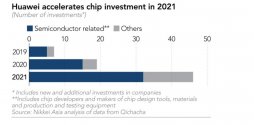Huawei bets big on chip packaging to counter U.S. clampdown
China's Huawei Technologies is aggressively ramping up its chip packaging capabilities to lessen the impact of a U.S. clampdown that has cut the company's access to vital semiconductor production technologies, sources briefed on the matter told Nikkei Asia.
Chip packaging refers to the final step in semiconductor manufacturing before they are mounted onto print circuit boards and assembled into electronic devices. Compared to the manufacture of chips themselves, less of the relevant technology is controlled by American companies. Washington has cut off Huawei's access to advanced U.S. chipmaking technologies since 2019, citing national security concerns.
One example of Huawei's new focus is a recent collaboration with Quliang Electronics, a little-known chip packaging and testing supplier based in Fujian Province. Quliang is rapidly expanding its production capacity in the city of Quanzhou to help Huawei put its advanced chip assembly designs into production and trial some of the company's cutting-edge chip stacking and packaging technologies, four people familiar with the matter told Nikkei Asia.
The Fujian government is among the most supportive of Huawei's ambition to beef up its chip packaging capabilities, the sources added, though the company is also looking for manufacturing partners in several other provinces.
The embattled tech giant has also accelerated efforts to hire experts from leading suppliers like ASE Technology Holding of Taiwan, the world's top chip packing and testing service provider, sources told Nikkei Asia. ASE declined to comment.
Partnerships with local tech giant are another strategy Huawei is pursuing. The company has teamed up with display champion BOE Technology Group to develop panel-level chip packaging technology, in which chips are assembled on display panel-like substrates, rather than on the usual wafer materials, people familiar with the matter said. This novel approach is among new and established industry players, such as Powertech Technology, the world's biggest memory chip packaging service provider.
Such moves are part of Huawei's ongoing push to improve its overall chip capabilities. In 2021 alone, the company's investment arms -- including Hubble Technology Investment Co. -- took or raised stakes in more than 45 domestic tech companies, Nikkei Asia analysis showed, more than double the figure in 2020. Some 70% of its investments last year were in semiconductor-related suppliers, ranging from chip developers, design tools to production equipment and materials.
Non paywall

